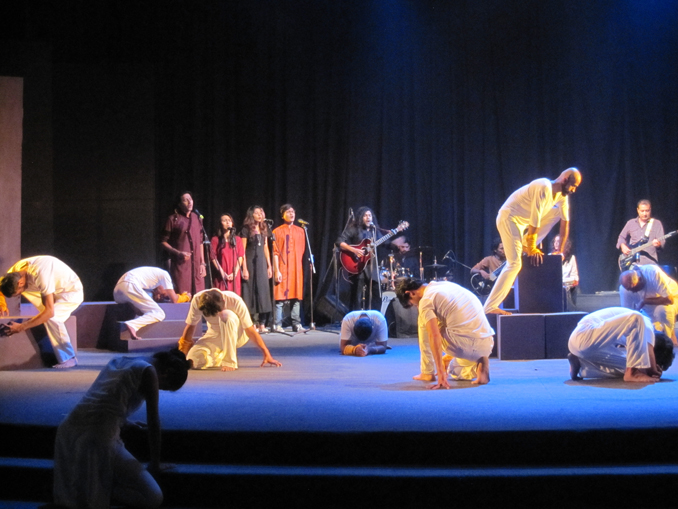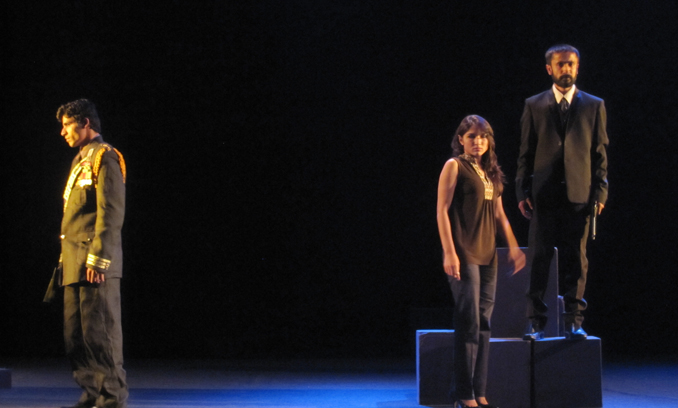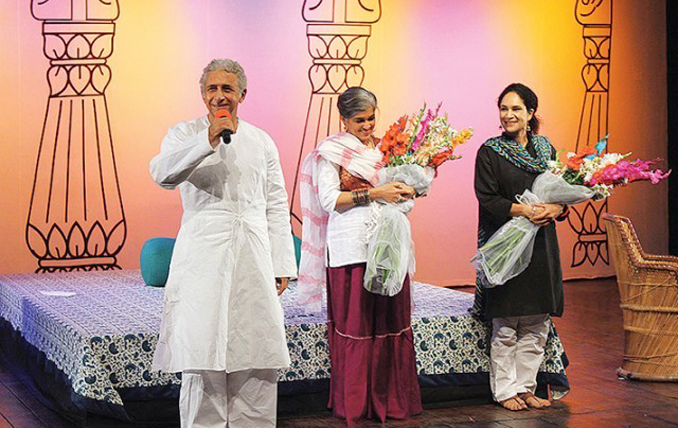Written by: Zahrah Mazhar
Posted on: March 31, 2014 | 
Zia Mohyeddin and Zain Ahmed
The National Academy of Performing Arts (NAPA) International Theatre Festival 2014 officially opened on March 4 with Oedipus Rex. But it is safe to say that the organisers as well as Karachiites knew that it was the much awaited ‘Ismat Apa key Naam’ which would set the ball rolling for wonderful theatre.
Karachi’s residents have always loved theatre, which is why the festival, the first of its kind in the city, drew crowds almost every day during its 24-day run. The NAPA in-house theatre not only became their second home during this time, but it also introduced them to foreign members of the theatre family. Language was not an issue as residents of the city welcomed the Theatre Village from Nepal, Fuel Theatre from England and German artist Brigel Gjoka. The Saltlake Mohnitharan from India brought Hindi to the festival and Ajoka from Lahore added a touch of Punjabi. Four plays by NAPA and one by Tehreek-e-Niswan represented Karachi’s talent in the festival. In total, fourteen plays were staged, including those from India, England, Germany and Nepal. The opening performance was by NAPA’s graduating class.
Zain Ahmed, festival director and the brains behind the international festival, began by thanking the international performers and crew for travelling to Karachi “no matter what the halaat”. Next on stage was NAPA’s president, Zia Mohyeddin, and as always, even the shortest of speeches that he gave left the audience inspired. He spoke of the messages theatre conveyed, hoping that the artists performing during the event would be able to express their ideas to the audience. The festival opened with a preview of NAPA’s upcoming play, Shakuntala, which is scheduled to be staged in April. The audience enjoyed the choreography and music during the performance which was brief, albeit long enough to capture people’s interest in the unseen production.
 |
For the opening play, the Greek tragedy, Oedipus Rex by Sophocles, was staged in Urdu by the academy’s third year students. The real tragedy, however, was the amateur acting and lack of theatrics. Tariq Raja, one of the better performers, played Oedipus – the king of Thebes who was married to Jacosta, the wife of the earlier monarch. Sonia Ashraf, who played Jacosta, was easily the weakest link. She lacked the emotions and reactions required for her part and simply did not fit the role.
 |
The other actors - Kashif Husain as Jocasta’s brother Creon, Zohair Raza as the seer Tiresias, Ali Rizvi as Chorus and Hammad Sartaj as the messenger from Corinth – all struggled with their roles. All in all they managed to hold the play together long enough for the tragedy to strike. Perhaps if more attention had been paid to the costumes and the backdrop, the audience could have overlooked at least a few of the acting glitches.
 |
Ismat Apa Ke Naam by the Motley Theatre of India was the only play in the festival to have four shows. And in each show, there were two standing ovations – first when Naseeruddin Shah stepped on to the stage to introduce the play and second, when the play ended.
Since the moment word got out that Naseeruddin Shah would be performing in the festival, his play became the most anticipated one. The hall was packed with actors, singers, journalists, dancers, politicians and many others. While Naseeruddin Shah might have been the star attraction, his daughter Heeba Shah and wife Ratna Pathak Shah proved that the talent most definitely runs in the family.
The play, a celebration of Ismat Khanum Chughtai, was divided in three stories. Each actor narrated one, taking on multiple roles and using minimal props and maximum actions. The youngest of the Shahs went first with ‘Chhui Mui’, a story about a woman unable to carry a child to term, making her fear that her husband would remarry. The brilliant narration, perhaps the best of the night, also involved enacting a pregnant woman who gives birth to a child in a train carriage. Heeba’s storytelling abilities, her pitch and tone and her movement were all perfection – making the play funny, engaging and thought provoking.
Next was Ratna Pathak who told the story ‘Mughal Bacha’ or ‘Ghoonghat’. Delightfully funny with an insight into the society’s obsession with skin colour, the story revolved around a couple - Kaale Mian and Gori Bi - who enter into a power struggle right from their wedding night over who would lift Gori Bi’s veil. Ratna Pathak’s grandmother-like narration was exceptional, especially when she deftly switched from Kaale Mian to Gori Bi. It was delightful to see that the actor was just as much into her character as the narrator, given that she played the characters in her narration as well.
Naseeruddin Shah came last with the story, ‘Gharwali’, and while his was the longest of the three, it was also the most comical. The story was about a beautiful woman, Lajjo, who develops a lifestyle of using her looks to survive in life. While Lajjo is shown to have had many admirers, she sets her eyes on Mirza Irfan – initially in greed of his house but later developing affection for the grumpy man. Lajjo goes from being the maid to Mirza Irfan’s wife, her marital status also changing Mirza Irfan’s attitude towards her. This transformation pokes fun at the difference in how society treats women who are on their own as compared to those who have a man claiming ownership.
Naseeruddin Shah’s stage presence was undoubtedly powerful and his vast theatre experience was evident in his knowledge of how to use every inch of the stage and when to use even the smallest of gestures to elicit a reaction from the audience. One of the most memorable moments was when Naseeruddin Shah transformed from a shy Mirza Irfan on a moral high-horse to the Mirza Irfan struggling with his inner desires after being tantalized by Lajjo’s bare leg.
The impeccable performances left the audiences wanting more, with people already discussing how much they’re looking forward to the Shahs’ return to Karachi!
You may also like: